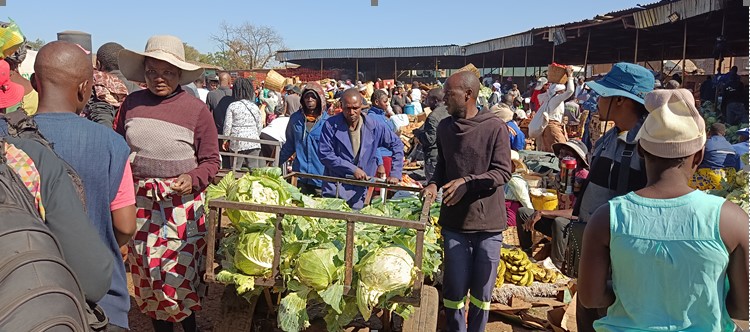When a vibrant sense of belonging is more important than selling commodities
While corporates are more interested in agricultural commodities than producers, African territorial markets thrive on the notion that farmers, traders and consumers value a sense of belonging more than commodities. These key actors want to be part of something that feels like it’s going somewhere. Most farmers don’t just want to submit their commodities to buyers and return back home without understanding what happens to those commodities thereafter. Instead of focusing on selling individual commodities in isolation, each market is a business ecosystem where friendships, genuine collaboration and a deep sense of belonging is cultivated.

By expanding their networks, farmers, traders, transporters, vendors and all other actors make it clear that they are looking for something bigger than their small communities and usual circle of peers. Collective solutions generated in the mass market foster resilience. Unfortunately, most of this critical information is rarely found in one place in the market or farming community. With the right investment in appropriate technology and content, digitalization can assist in turning such information into a fluid resource that can be combined with lived experience. When properly developed, an inclusive knowledge and information platform can give farmers, traders and all value chain actors including policy makers updates and early warning systems from what is happening in markets daily. These early warning can become the basis for informing research, research methodologies and literature review based on historical data over years of continuous fluid information gathering. This can become part of building blocks for home-grown solutions.
A system that does not link farmers with diverse markets is useless
Fluid information gathering requires active, reliable and timely information sources. In most African countries, much of the information coming from the grassroots communities does not have a clear destination due to fragmentation among government departments, diverse private sector players and development agencies all engaging the same communities. For farmers who have mastered the art of farming, major issues are now more about infrastructure and the market. That is why a system that does not link producers with diverse markets is useless. As demonstrated in most mass markets, farmers, traders and other value chain actors crave an ecosystem that enables them to interact freely. It is not enough for every farmer to own a smart phone because information from individual farmers makes more business sense when consolidated together into a stream of rich processed insights. There is need for administrators who can filter information so that farmers and traders don’t get lost in the sea of information or end up depending on half-truths.
From generic extension to responding to emerging issues and information overload
With information overload now confusing a lot of farmers, the role of extension services should be reconfigured from generic extension to gathering and process information into appropriate decision-making knowledge. That kind of extension should become more about responding to emerging issues and questions than teaching farmers how to grow crops because that information is now available from diverse sources including fellow farmers. The reconfigured extension services role can ensure a lot of research that has been done in many communities by several institutions like NGOs, the private sector and government departments is consolidated into a holistic body of knowledge that can be found at one place. When studies and information sources are fragmented, re-invention of the wheel continues and it remains difficult to deduce trends or growth pathways.
The value of giving community information a business angle
In most African countries, information or data collected by government agencies does not have a business angle thus many investors find it unusable. While government may just be interested in national statistics, a business person may not see business sense or value in a report that focuses on vulnerability assessments, for instance. That means governments have to consider out-sourcing information collection and processing services as part of generating value added information. However, caution must be sounded that if information is collected by an NGO or a private company focusing on specific value chains, such information becomes private property. The participation of all actors in socio-economic activities can only happen if much of the information is a public good like what happens in mass markets. Besides the fact that data collected by national statistical agencies lacks a business angle, the data collection criteria are often completely different from that used by business-oriented institutions like banks and food processing companies.
Setting up knowledge gathering platforms within mass market ecosystems is the fastest way of gathering information about diverse value chains. Such information and knowledge should be part of local farmers’ enterprises. It may not be ideal to expect farmers in distant areas to subscribe to an information platform that is based in the capital city. If farmers are able to provide information and statistics to their local knowledge centres, they begin to build their track records for financiers and other potential partners. Ideally, farmers belonging to a community should have their socio-economic information pooled together for the purposes of guiding investment unlike leaving each farmer with his/her fragmented information. The mainstream media can play a positive role by sharing local content in ways that informatively paint a clear national picture on the changing agriculture and food systems landscape. Without fluid information system, it is difficult to achieve agricultural transformation in ways that lift millions of people out of poverty.
Charles@knowledgetransafrica.com / charles@emkambo.co.zw /
Website: www.emkambo.co.zw / www.knowledgetransafrica.com
Mobile: 0772 137 717/ 0774 430 309/0712737430
